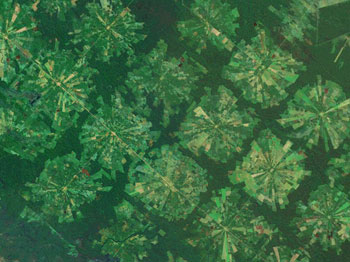Greenpeace accuses McDonald’s of destroying the Amazon rainforest
Rhett A. Butler, mongabay.com
April 7, 2006
After a year-long investigation, the environmental group Greenpeace has accused McDonald’s and other western firms of contributing to deforestation in the Amazon.
Greenpeace’s report, published today, alleges that much of the soy-based animal feed used by fast-food chains to fatten chickens is derived from soybeans grown in the Amazon Basin of Brazil.
Thanks to a new variety of soybean developed by Brazilian scientists to flourish in rainforest climate, soybean production has boomed in the region in recent years as firms have converted extensive areas of rainforest and cerrado, a savanna-like ecosystem, into industrial soybean farms. High soybean prices have also served as an impetus to expanding soybean cultivation and Brazil is on the verge of supplanting the United States as the world’s leading exporter of soybeans.
Philip Fearnside, co-author of a report in the journal Science and member of Brazil’s National Institute for Amazonian Research in Manaus, explains, “Soybean farms cause some forest clearing directly. But they have a much greater impact on deforestation by consuming cleared land, savanna, and transitional forests, thereby pushing ranchers and slash-and-burn farmers ever deeper into the forest frontier. Soybean farming also provides a key economic and political impetus for new highways and infrastructure projects, which accelerate deforestation by other actors.”
In “Eating up the Amazon” Greenpeace argues that much of the soybean production in the Amazon is illegal because producers often ignore environmental regulations that require landowners in the region to keep 80 percent of their forested areas standing. Further, notes Greenpeace, ranchers in the region have been implicated in debt-bondage, whereby ranchers trap poorly paid workers in “conditions analogous to slavery.” In 2005, 4,133 slaves were freed after Brazilian Swat-style teams raided 183 farms.
 Agricultural clearing in the Amazon rainforest. Satellite image courtesy of NASA |
Using satellite imagery, aerial surveillance, previously unreleased government documents and on-the-ground monitoring Greenpeace directly links Amazon soybean production to fast-food operators in Europe (the U.S. is largely self-sufficient in soy production and does not primarily rely on Brazil as a source for the crop). The group followed the movement of soy products from soy farmers in Brazil–including Brazil’s “soya king”, Blairo Maggi, who owns 2m hectares of soy farms in the Amazon and is the current governor of the state of Mato Grosso–to large agricultural traders–including Cargill, Bunge and Archer Daniels Midland who are responsible for financing about 60 percent of soya production in Brazil–to European poultry producers that supply fast-food restaurants with the meat that goes into chicken nuggets and sandwiches.
“This crime stretches from the heart of the Amazon across the entire European food industry. Supermarkets and fast food giants, like McDonald’s, must make sure their food is free from the links to the Amazon destruction, slavery and human rights abuses” said Gavin Edwards, the forests campaign co-ordinator for Greenpeace.
Greenpeace has targeted the chain in a new campaign launched in Britain, plastering McDonald’s restaurants with posters of Ronald McDonald carrying a chain saw.
Citing the importance of the issue, McDonald’s has already issued a response to the allegations in the report. Keith Kenny, senior director of quality assurance for McDonald’s Europe, told Reuters, the Associated Press, and other news outlets that the company was launching an investigation into Greenpeace’s claims.
“Worldwide, we take our supply chain and environmental responsibilities very seriously. We believe that the claim made by Greenpeace relates to the GM-free soya used in chicken feed,” Kenny is quoted in the Guardian. “We can confirm that we will be investigating this claim fully and will review it for consistency in line with our existing policy not to source beef from recently deforested areas. McDonald’s in the UK sources the majority of its food from the UK and Ireland. In 2005, over 17,000 British and Irish farmers supplied the company with ingredients.”
 Forest clearing in the Amazon. Photo by R. Butler. More pictures of deforestation |
McDonald’s has worked with Greenpeace on environmental issues in the past despite a bitter legal dispute, dubbed “McLibel”, that lasted much of the 1990s and involved an similarly named, but unrelated organization, “London Greenpeace”. The case, which was the longest trial in English legal history, was eventually found in favor of McDonald’s against two defendants accused of libel against the company. However, the drawn out nature of the proceedings, resulted in the case becoming a major source of embarrassment for the fast-food company.
Ironically Greenpeace’s current beef with McDonalds partly results from the insistence by environmental groups and European governments that McDonald’s use non genetically-engineered feed for its chicken products. Since Amazon soy is mostly GM-free, Europe serves a key market. A similar controversy has recently emerged with Europe’s push for biofuels which may boost native rainforest clearing for oil palm and soybean plantations in Asia and South America.
The Amazon is the world’s largest and most diverse expanse of intact forest in the world. Experts estimate that 15-20 percent of its 1.6 million square miles (4.1 million square kilometers) have been destroyed and warn that climate change could put further area at risk in the near future.